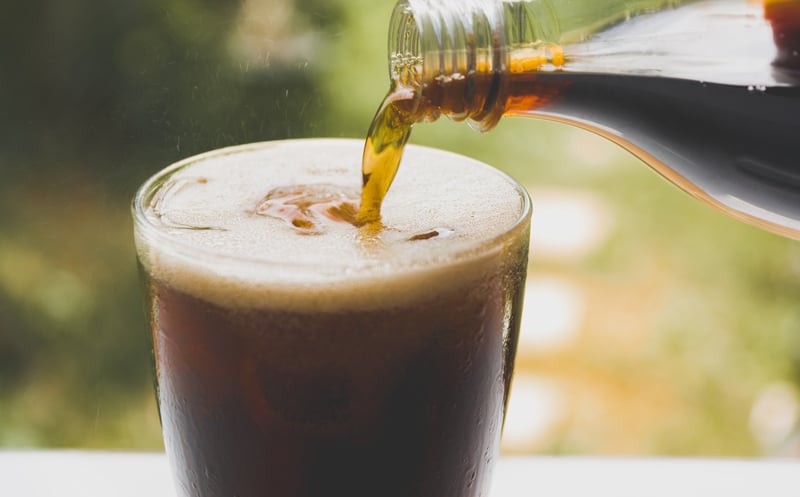5 Scary Reasons You Should Stop Drinking Diet Sodas

Most of us know that drinking regular soda—which fall under the umbrella of sugar-sweetened beverages (SSB)—is bad news for our health and waistlines. After all, they’re increasingly and notoriously associated with a laundry list of negative health outcomes. These include being overweight, obesity, type 2 diabetes, metabolic syndrome (MetS), neurodegenerative conditions, cardiovascular disease, stroke, dental cavities, and more.1 Pretty much, you name it, and you can find a connection to regular consumption of these sugary beverages.
Naturally, this has led many people to reach for diet sodas, which contain non-caloric, high-intensity artificial sweeteners. And they do so often at the urging of researchers, healthcare practitioners, and authoritative health organizations. On the surface, this seems rational and potentially beneficial. Especially for reducing caloric intake, promoting weight management, and improving metabolic health. However, striking evidence is accumulating that opposes the regular consumption of artificial sweeteners.
For instance, Susan E. Swithers, a professor of psychological sciences and a behavioral neuroscientist at my alma mater Purdue University, says, “Although it seems like common sense that diet sodas would not be problematic, that doesn’t appear to be the case. Findings from a variety of studies show that routine consumption of diet sodas—even one per day—can be connected to higher likelihood of heart disease, stroke, diabetes, metabolic syndrome, and high blood pressure, in addition to contributing to weight gain.”2
5 Reasons Diet Soda is Bad For You
Glycemic Control, Metabolic Function, and Gut Health
With zero calories and no sugar, there shouldn’t be any concern about diet sodas when it comes to carbohydrate management and metabolic health, right? Wrong. Multiple studies have shown that consuming artificially sweetened sodas is associated with an increased risk of type 2 diabetes and metabolic syndrome (MetS).3,4
If you’re not familiar with MetS, it’s the health-ravaging combination of high blood pressure, high blood sugar, excess belly fat, and unhealthy blood lipids/fats (e.g., high triglycerides, low “good” HDL cholesterol). It’s collectively tied to an increase in seemingly all non-communicable chronic diseases. (This includes cardiovascular disease, stroke, diabetes, certain cancers, neurodegenerative diseases, and more.)
It’s worth noting that one study found the daily consumption of diet soda was associated with a 36% greater risk of MetS. It was also associated with a 67% increased risk of developing type 2 diabetes.5 As far as MetS, daily diet soda consumption was associated with significantly greater risk for abdominal obesity and high fasting blood sugar. In other words, more belly fat and impaired glycemic control—no bueno!
It’s important to point out that studies like these show associations (not causation). Some studies have suggested that confounding factors (e.g., health status, diet quality, body mass index) may explain the association.6 There’s also “the chicken or the egg” argument. That is, some folks who drink diet sodas may be doing so to lose weight, which would confound the results of an observational study.
Having said that, there are plausible explanations for the association. For instance, some speculation suggests consuming artificially sweetened beverages stimulates the appetite for sweetness and more energy-dense foods at subsequent meals.7 Additionally, some people overcompensate for the calories they “saved” by drinking diet sodas by overconsuming other foods or beverages.5 This type of compensation falls under the umbrella of what’s known as “hedonic eating.” This is our drive to eat for pleasure rather than for hunger.
More recently, Israeli researchers found that artificial sweeteners negatively alter the balance of gut bacteria (i.e., gut dysbiosis), leading to glucose intolerance and impaired metabolic function.8 What’s more, previous research has shown artificial sweeteners (such as sucralose) may adversely affect glucose metabolism and increase insulin resistance. These are effects that may be especially pronounced in overweight and obese folks.9
Cardiovascular Disease and Stroke
In a recent study published in the American Heart Association journal Stroke, researchers examined whether sugar- or artificially sweetened beverage consumption was associated with the risks for stroke or dementia. They found that drinking diet soda daily resulted in a threefold increased risk for dementia (including Alzheimer’s disease) and stroke compared to folks who don’t drink diet soda.17
Although this study has grabbed headlines, it’s certainly not the first to shine the spotlight on this potential link. For example, results from the Northern Manhattan Study found diet soda consumption was associated with an increased risk of stroke and heart attack.18 A study based on data from the Nurses’ Health Study and the Health Professionals Follow-Up Study found regular consumption of diet sodas was associated with a significantly higher risk of stroke.19 In a separate report from the Nurses’ Health Study, researchers found diet soda consumption was associated with an increased risk of coronary heart disease (CHD).20
In a study with nearly 60,000 women participants in the Women’s Health Initiative Observational Study, researchers from the University of Iowa found that compared with women who never or rarely drank diet sodas, women who consumed two or more per day were 30% more likely to have a cardiovascular event (such as CHD, heart failure, heart attack, or stroke). And, they were 50% more likely to die from heart disease.21 In a recent systematic review, researchers from Canada found consumption of artificial sweeteners was associated with higher incidence of high blood pressure and cardiovascular events.15
Considering that at least 20% of Americans drink at least one diet soda every day, these findings are momentous.22 On top of that, consider that type 2 diabetes and MetS, which seem to be closely tied to diet soda consumption, are also major risk factors for heart disease and stroke.
Weight Gain and Obesity
When it comes to weight management and diet sodas, you can probably already see the writing on the wall. We already talked about the potential link between artificially sweetened beverages and an increased risk for abdominal obesity. And we mentioned it’s not uncommon for folks to overeat—whether consciously or unknowingly—when they consume diet sodas.
Along these lines, recent research suggests diet soda drinkers seem to develop somewhat of a resistance to sweet tastes. In other words, they experience less of a reward response for a given amount of sweetness. This lends some insight into the link between diet soda consumption and obesity.10 But there’s more.
In the San Antonio Heart Study, researchers looked at weight change among over 3,600 men and women across a 7 – 8-year period. They found that risk of weight gain and obesity were significantly greater in those who regularly drank diet sodas compared to those who did not.11
Additional observational studies have corroborated these findings. And, several review studies have documented the potential link between diet soda consumption and weight gain.12–14 In a recent systematic review, researchers concluded that consumption of artificial sweeteners is associated with weight gain, increased waist circumference, and higher likelihood of obesity.15
While there are multiple explanations for this connection, it’s fair to point out that the results of these studies are inconsistent. And in these studies, there’s the possibility of “reverse causality,” or “the chicken or the egg” theory again. So, while all this associative research is intriguing, there’s no contending that randomized trials provide the most compelling (and causal) evidence.
Along those lines, in a recent study published in The American Journal of Clinical Nutrition, researchers from Iran compared the effects of replacing diet sodas with water during a weight-loss trial. After 24 weeks of following a reduced-calorie diet, all the women in the study lost weight. Interestingly, however, women who drank only water lost 16% more weight. They also experienced greater improvements in insulin sensitivity and glycemic control compared to women who drank diet soda.16 Even more interesting, the diet soda group only consumed one artificially sweetened beverage per day five days out of the week. That’s a relatively small amount.
Dementia, Cognitive Dysfunction, Behavior, and Mood
We’ve already touched on the association between diet soda and dementia, including Alzheimer’s.17 Type 2 diabetes is also a known risk factor for dementia.23 In fact, many refer to Alzheimer’s disease as “type 3 diabetes” due to its overlap with type 2 diabetes, including insulin resistance in the brain.24 As we previously outlined, there’s compelling evidence suggesting the artificially sweeteners found in diet sodas can induce insulin resistance and impair glucose tolerance.
In a study published in the journal Drug and Chemical Toxicology, researchers found that long-term consumption of aspartame significantly reduced glutathione concentrations in the brain.25 Glutathione is an important component of the brain’s antioxidant defense system. The researchers also found aspartame ingestion led to an imbalance in the antioxidant/pro-oxidant status in the brain, which is the definition of oxidative stress. Unsurprisingly, given its role in preventing oxidative stress, reduced glutathione concentrations are associated with Alzheimer’s disease and numerous other neurodegenerative conditions.26
In a study published in the journal Redox Biology, researchers once again connected aspartame to altered neural function and neurodegeneration. In this study, researchers from India found long-term consumption of aspartame, a sugar substitute consumed by roughly 200 million people worldwide, significantly increased oxidative stress (e.g., reduced glutathione, increased free radicals) in the brains of rats leading to distorted brain function and to the death of brain cells.27
While many of the studies on artificial sweeteners have been conducted on animals, there is some emerging human evidence as well. For instance, in a study published in the journal Research in Nursing & Health, researchers assessed the short-term effects of aspartame on neurobehavioral effects. Subjects consuming a moderate amount of aspartame for 8 days were more irritable in mood, exhibited more depression, and performed worse on spatial orientation tests.28
In another study, researchers from the National Cancer Institute evaluated the connection between soft drink consumption and the risk of depression among a sample of over 260,000 participants in the NIH-AARP Diet and Health Study. They found frequent consumption of diet sodas significantly increased the risk for depression among older adults.29
One possible explanation is that artificial sweeteners such as aspartame has neurological effects. These may lead to imbalanced levels of key neurotransmitters, including dopamine and serotonin. This is interesting because it may also tie into issues like headaches and insomnia that some people experience when consuming diet sodas and other artificially sweetened products.30
Cancer
Part of the reason the artificial sweetener aspartame is thought to increase the risk of neurologic deficits and cancer is because of its conversion to methanol and formaldehyde.30 Briefly, aspartame is made up of three ingredients: methanol, aspartic acid, and phenylalanine. When stored near or above room temperature, methanol is metabolized into formaldehyde, which is a known human carcinogen.
In a study published in The American Journal of Clinical Nutrition, researchers examining data from the Nurses’ Health Study and Health Professionals Follow-Up Study found an alarming statistic. Men and women drinking one or more diet sodas per day had a 42% greater risk of leukemia compared to those who consumed none.31
Listen, I’ll be the first to admit that the majority of the evidence highlighted here demonstrates associations (not necessarily cause-effect relationships). A fact I’ve made it a point to reiterate multiple times. However, it seems fair to speculate that diet soda consumption (via artificial sweeteners, hedonic eating, or another mechanism) is at least a “probable suspect” for various negative health outcomes including:
- Type 2 Diabetes
- Metabolic Syndrome
- Gut Dysbiosis
- Weight Management
- Cardiovascular Disease
- Stroke
- Dementia
- Cognitive Dysfunction
- Mitochondrial Dysfunction
- Behavior and Mood Disorders
- Certain Types of Cancer
“’Are diet sodas worse for you than regular sugar-sweetened sodas?’ I think that’s the wrong question,” says Susan E. Swithers. The real question: “What good are [diet] sodas for you in the first place?”








